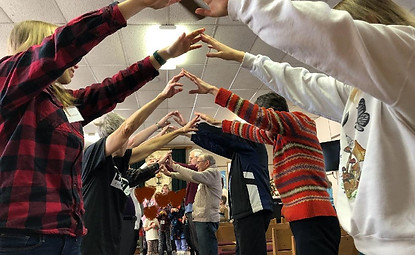121 9th Street S
Fargo, ND 58103
(701) 235-0394
Sunday Services - 11:00am
Childcare and Religious Education Offered

Religious Education
Religious Education, or “RE” as we refer to it most, is a space where all children, preschool age and up, gather to explore topics central to our UU faith. We discuss UU history, our 7 Principles and traditions, learn about different faith practices, religions, and belief systems, engage in Social Justice education and action, and each child in our program is encouraged to feel safe asking questions to further each of their spiritual and personal journeys.
Our teachers believe that children have the right to find their own truth and meaning, just like in our principles! This is actively displayed through Montessori and Socratic Education Styles.
Get To Know The Program
About Early Childhood RE
Spirit Play Religious Education
About Spirit Play RE



We see the purpose of religious education as helping children in living into their own answers to the existential questions, as: Where did we come from? What are we doing here? What is our purpose? How do we choose to live our lives? What are our gifts? How do we use them? What happens when we die? Why do we die? Why are we lonely and sad sometimes?
We use the Montessori approach and Berryman's morning-as-worship approach for the structure of the morning. As in Montessori, the key elements are the classroom environment and the teachers. These elements free the children to work at their own pace on their own issues.
In a typical Spirit Play morning:
-
The Doorkeeper helps the children get ready to enter the classroom.
-
The Storyteller leads the circle in the story of the day, followed by wondering.
-
Children choose an individual/group work or use a story previously heard to further their spiritual growth.
-
Children clean-up, and take part in a feast (snack) as they feel ready and clean up after themselves, asking for help if needed.
-
Leave-taking is a formal process of saying goodbye to the Storyteller and Doorkeeper.
Until a child is gathered by their adult, they remain with Emma (or the lead teacher(s) ) until their adult arrives.
About Socratic Youth RE
We see the purpose of religious education as helping children in living into their own answers to the existential questions, as: Where did we come from? What are we doing here? What is our purpose? How do we choose to live our lives? What are our gifts? How do we use them? What happens when we die? Why do we die? Why are we lonely and sad sometimes?
We use the Montessori approach and Berryman's morning-as-worship approach for the structure of the morning. As in Montessori, the key elements are the classroom environment and the teachers. These elements free the children to work at their own pace on their own issues.
In a typical Socratic morning:
-
The Doorkeeper helps the children get ready to enter the classroom.
-
The Storyteller leads the circle in the story of the day, followed by wondering.
-
Children choose an individual/group work or use a story previously heard to further their spiritual growth.
-
Children clean-up, and take part in a feast (snack) as they feel ready and clean up after themselves, asking for help if needed.
-
Leave-taking is a formal process of saying goodbye to the Storyteller and Doorkeeper.
Until a child is gathered by their adult, they remain with Emma (or the lead teacher(s) ) until their adult arrives.


_HEIC.png)




